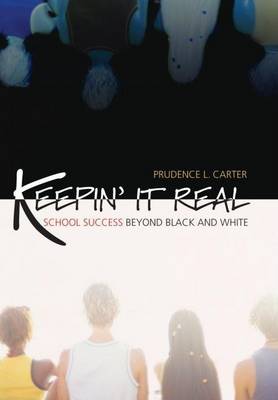Transgressing Boundaries: Studies in Black Politics and Black Communities
1 total work
Keepin' It Real: School Success Beyond Black and White
by Prudence L Carter
Published 1 January 2005
Why do so many African American and Latino students perform worse than their Asian and White peers in classes and on exams? And why are they dropping out of school at higher rates? Common wisdom holds that racial stratification leads African American and Latino students to rebel against "acting white," thus dooming themselves to lower levels of scholastic, economic, and social achievement. But is this true? Do minority students reject certain practices, such as excelling in school, and thus their own mobility, because they fear that peers will accuse them of forsaking their own racial and ethnic identities? Keepin' It Real sets the record straight. Drawing on survey fieldwork and interview data from low-income Latino and African-American youth in New York City, Prudence Carter here shows that African American and Latino youth are no different than other youths in valuing education as the key to economic mobility. Rather, resistance to "acting white" indicates a rejection only of the generic American, "white," middle-class styles of interaction, speech, dress, and musical tastes.
Carter further demonstrates that the most successful negotiators of our school systems are not necessarily those who assimilate into the dominant white mainstream, but rather those most adept at crossing the cultural divide. These students, which she terms multicultural navigators, do not "act white" or "act black". Rather, these culturally savvy teens harvest resources from multiple traditions--whether it be knowledge of hip hop or of classical music--to strategically negotiate different expectations and achieve their high ambitions. Capturing the diversity of African American and Latino youths' experiences, Keepin' it Real refutes facile, convenient assumptions about teenage behavior and racial difference. Carter concludes with positive steps that both teachers and students can take to help close the black-white education gap. By working together to promote cultural insight and intercultural communication, educators, parents, community leaders, and students can help ensure that school success truly has no color.
Carter further demonstrates that the most successful negotiators of our school systems are not necessarily those who assimilate into the dominant white mainstream, but rather those most adept at crossing the cultural divide. These students, which she terms multicultural navigators, do not "act white" or "act black". Rather, these culturally savvy teens harvest resources from multiple traditions--whether it be knowledge of hip hop or of classical music--to strategically negotiate different expectations and achieve their high ambitions. Capturing the diversity of African American and Latino youths' experiences, Keepin' it Real refutes facile, convenient assumptions about teenage behavior and racial difference. Carter concludes with positive steps that both teachers and students can take to help close the black-white education gap. By working together to promote cultural insight and intercultural communication, educators, parents, community leaders, and students can help ensure that school success truly has no color.
